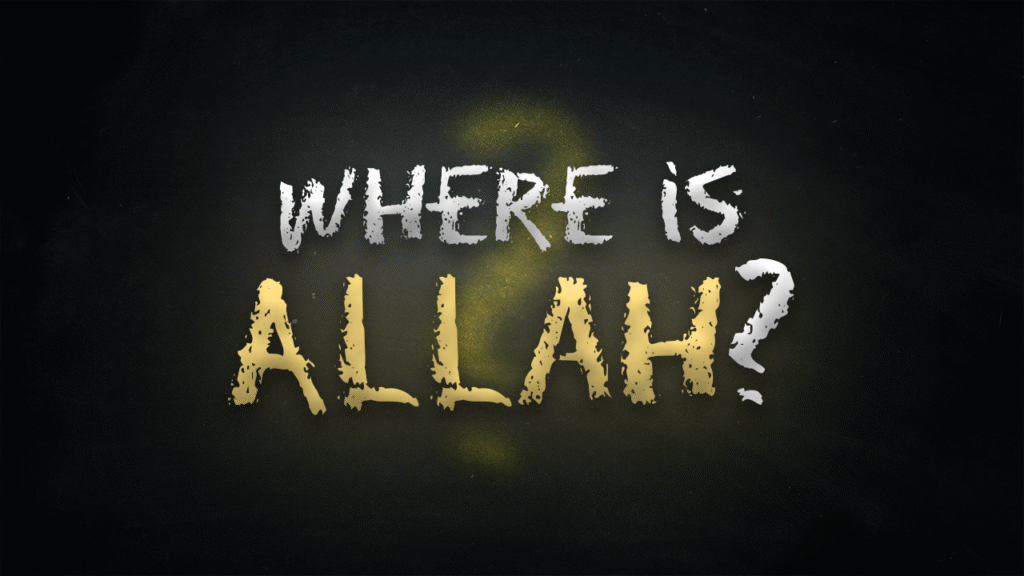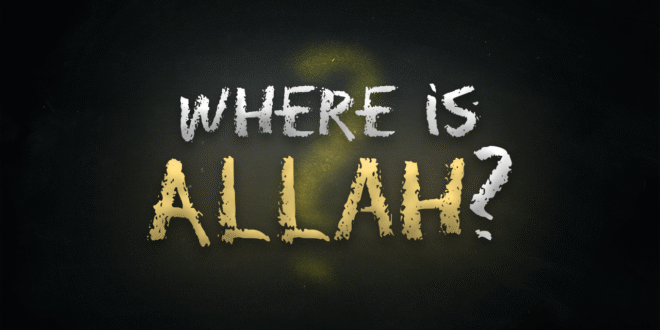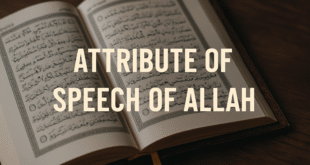One of the most foundational beliefs in Islam is understanding how Allah describes Himself.Yet, over time, many deviated from the clear path of the Qur’an and Sunnah, introducing philosophical ideas foreign to the early generations.
Among the most debated questions:
Where is Allah?
Let’s start with The Qur’an’s Clarity on Allah’s Transcendence] Allah says:
Do you feel secure that He who is in the heaven would not cause the earth to swallow you?[Surah Al-Mulk: 16]
This verse — and many others — affirm that Allah is above His creation.The direction of transcendence (‘uluww) is clear, not metaphorical.
Allah explicitly mentions His rising over the Throne in seven places:
1. The Most Merciful [is] above the Throne established.
[Surah Taha: 5]
2. Indeed, your Lord is Allah, who created the heavens and the earth… then He rose over the Throne.
[Surah Al-A‘raf: 54]3. It is Allah who created the heavens and the earth in six days — then He rose over the Throne.
[Surah Yunus: 3]4. Allah is He who created the heavens and the earth… then He rose over the Throne.
[Surah Ar-Ra‘d: 2]5. Then He rose over the Throne — the Most Merciful.
[Surah Al-Furqan: 59]6. Who created the heavens and the earth… then He rose over the Throne.
[Surah As-Sajdah: 4]7. It is He who created the heavens and the earth… then He rose over the Throne.
[Surah Al-Hadid: 4]These are not vague (متشابه) or symbolic. The language is direct.
The Understanding of the Salaf The early generations — the Salaf — took these verses as they were.They affirmed Allah’s attributes without interpeting them away, and without comparing them to creation.
Imam Al-Awza‘i said:“We used to say: Allah is above His Throne, and we believe in what has come in the Sunnah regarding His attributes.
(Al-Asma’ wa al-Sifat by Al-Bayhaqi, vol. 2, p. 304)
Zakariyyā al-Sājī said:“The position regarding the Sunnah, which I saw our companions—the Ahl al-Ḥadīth whom we met—adhering to, is that Allah, Exalted is He, is above His Throne and His Heaven, and He draws near to His creation however He wills.
(source: Ijtimāʿ al-Juyūsh al-Islāmiyyah by Ibn al-Qayyim, vol. 2, p. 245):
Ibn Battah narrated: The Muslims, from the Companions and Successors, had consensus that Allah is above His Throne, above His heavens, separate from His creation.
(Al-Ibanah, vol. 7, p. 136)
Abū ʿUmar al-Ṭalamankī al-Andalusi said: The Muslims from among Ahl al-Sunnah are unanimously agreed that the meaning of His saying: ‘And He is with you wherever you are’ [al-Ḥadīd: 4] and similar verses in the Qur’an is that it refers to His knowledge, and that Allah, Exalted is He, is above the heavens with His Essence, established upon His Throne however He wills.
(book Al-Wuṣūl ilā Maʿrifat al-Uṣūl source: Al-ʿUluw lil-ʿAliyy al-Ghaffār by Imām al-Dhahabī, p. 246)
Abu Nasr al-Sijzi said “Our Imams—such as Sufyān al-Thawrī, Mālik ibn Anas, Sufyān ibn ʿUyaynah, Ḥammād ibn Salamah, Ḥammād ibn Zayd, ʿAbd Allāh ibn al-Mubārak, Fuḍayl ibn ʿIyāḍ, Aḥmad ibn Ḥanbal, and Isḥāq ibn Ibrāhīm al-Ḥanẓalī—are unanimously agreed that Allah, Glorified be He, is in His Essence above the Throne; that His knowledge encompasses every place; that He will be seen on the Day of Judgment by the eyes above the Throne; that He descends to the lowest heaven; that He becomes angry and pleased; and that He speaks with whatever He wills. Whoever opposes any of this, he is absolved from them, and they are absolved from him.
in his book Al-Ibānah (as quoted in Siyar A‘lam al-Nubalā’ by al-Dhahabi, vol. 17, p. 656)
Abū ʿUthmān al-Ṣābūnī said : “The adherents of ḥadīth believe and testify that Allah, Glorified and Exalted, is above His seven heavens, upon His Throne, as stated explicitly in His Book… The scholars of the Ummah and the prominent imams from the Salaf—may Allah have mercy on them—did not differ regarding that Allah is upon His Throne, and that His Throne is above His heavens.”ʿAqīdah al-Salaf wa Aṣḥāb al-Ḥadīth, p. 44:Ibn ʿAbd al-Barr said, after mentioning the ḥadīth of Allah’s descent: “In it is evidence that Allah, Mighty and Majestic, is upon the Throne, above the seven heavens—as the group (of scholars) have said. It is among their proofs against the Muʿtazilah and the Jahmiyyah who claim that Allah, Mighty and Majestic, is in every place and not upon the Throne.
in Al-Tamhīd limā fī al-Muwaṭṭa’ min al-Maʿānī wa al-Asānīd, vol. 7, p. 129
The Philosophical Response — Ash‘ari & Kalam Influence] Centuries later, groups like the Ash‘aris introduced a different theology.Influenced by Greek logic and philosophical thought, they claimed:“Allah is neither inside the world, nor outside of it… neither above, nor below.
Al-Ghazali said: Allah is neither outside the world nor inside it.
(Tahafut al-Falasifah, p. 252)
Fakhr al-Razi stated:“The Creator exists neither inside the world nor outside it, neither connected nor disconnected.
(Matalib al-‘Aliyah, vol. 7, p. 50)
Al-Amidi echoed:“Allah is neither inside the world nor outside of it.
(Abkar al-Afkar, vol. 2, p. 45)
These statements are logically incoherent and theologically dangerous, because they lead to denying Allah’s existence altogether,
A‘udhu billah. Interpetation vs Submission
Some argued that verses about Allah’s Throne or being “above” must be interpreted metaphorically — as sovereignty or power. For example,
Al-Jurjani said:“The sitting appears from the text but rational proof forbids it, so it must be interpreted as sovereignty.
(al-Mawaqif lil iji vol 3 p144)
But this approach subjects Revelation to human reasoning, something the Salaf warned against repeatedly.
One of the greatest issues in which the Ashʿarīs opposed the doctrine of the Salaf is the attribute of Allah’s Highness and His description of being established above His Throne in a manner befitting His Majesty — exalted is He.
For they innovated the notion that He, glorified be He, is neither inside the world nor outside it, neither above nor below.
Al-Dhahabī said:“As for the third statement that later emerged, claiming that Allah the Exalted is neither within places nor outside of them, nor above His Throne,neither connected to his creation nor separated from it, nor is His sanctified Essence confined to any spatial dimension rather, He is Not seprate from His creation, neither within directions nor outside of them — then this is something the mind cannot grasp nor understand.
It contradicts the verses and the prophetic reports.
So abandon this innovation, and the views of the theologians. Believe in Allah and what has come from Allah according to His intent. Entrust your matter to Allah. There is no power and no strength except with Allah”.
(Al-‘Uluw lil-‘Aliy Al-Ghaffar, page 268)
The Way Forward The correct belief — the belief of the Prophet, his Companions, and the righteous predecessors — is simple:
Allah is above His creation, above the seven heavens, above the Throne, in a manner befitting His majesty, without comparison, and without asking how.
We affirm what Allah affirmed. We stop where the Salaf stopped.We reject the confusing paths of speculative theology and return to the clarity of Revelation.> This is the path of safety.—[Conclusion Voice-over — Calm, serious tone]> Oh Muslims, beware of those who distort the attributes of Allah.Hold firmly to the creed of Ahlus Sunnah wal Jama‘ah, based on the Qur’an, the authentic Sunnah, and the understanding of the righteous predecessors.
May Allah keep our hearts firm upon the truth and protect us from the trials of misguidance.
don’t forget to keep us in your du‘a.Jazakum Allahu khayran.
by Abu Ibrahim Al-athari Al-Hanbali ⬇️
https://youtu.be/3eDp3kXbUy4?si=3b9t_sQnkpj_zwn1

 World Dawah Quran & Sunnah through understanding of Salaf
World Dawah Quran & Sunnah through understanding of Salaf

